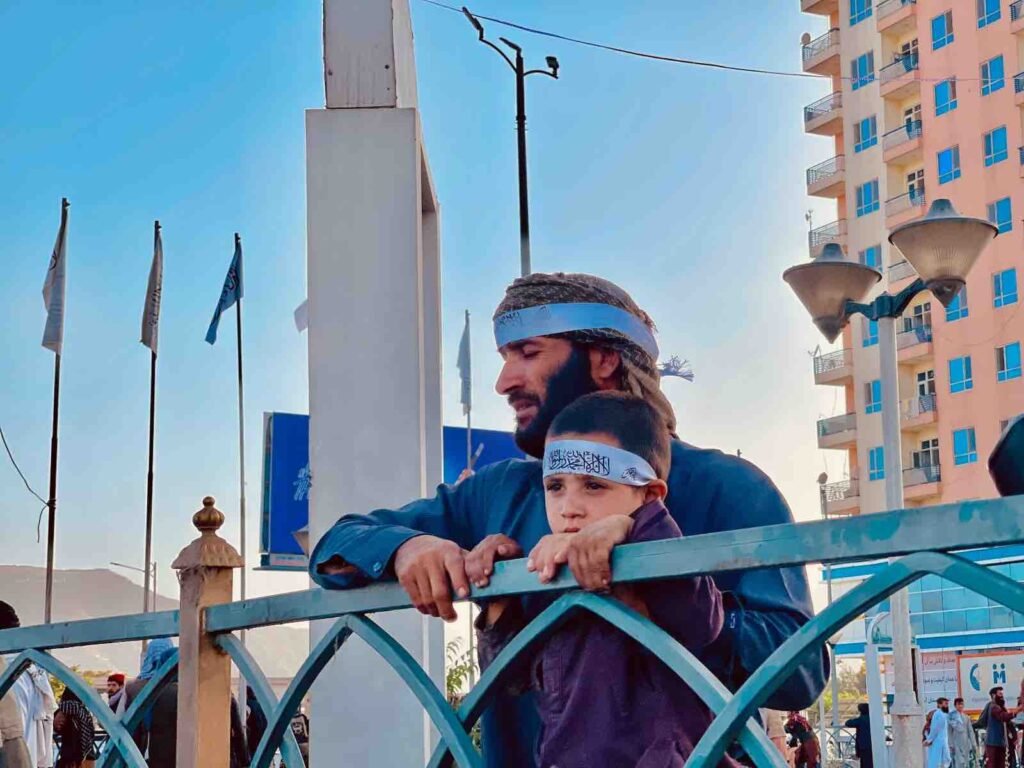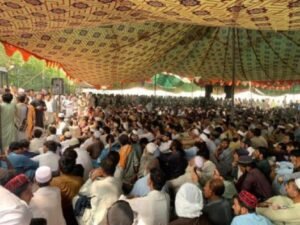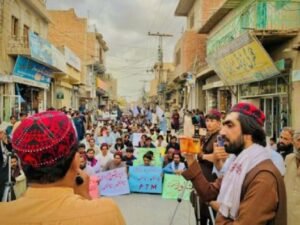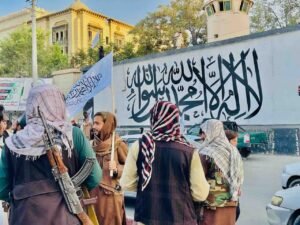Exploring Radicalization’s Influence in a Fertile Ground

A father and son marked with a strip on their foreheads during a Taliban victory anniversary in Kabul. The inscription reads: 'There is no God but Allah, Mohammad is the messenger of Allah.' Photo by @AADIL for ADN.
By Hamid Pakteen
In the intricate tapestry of Pakistan’s societal fabric, the specter of radicalization casts a pervasive shadow, threatening the nation’s pluralistic ethos and internal cohesion. This phenomenon, transcending geographical and cultural boundaries, has found fertile ground within Pakistan, fueled by a complex interplay of historical legacies, socio-economic disparities, and political maneuvers.
A critical examination of Pakistan’s education system unveils a troubling narrative, where the portrayal of Islam remains narrow, fostering an environment conducive to radicalization. Within certain religious institutions or madrasas, the absence of opportunities for critical analysis and exposure to diverse perspectives perpetuates the cycle of extremism, exacerbating societal divisions.
Recent years have witnessed a troubling surge in radicalization, exemplified by a series of tragic terror attacks that have left scars on the national psyche. Yet, these incidents are symptomatic of deeper fissures within society, exacerbated by governmental policies and societal norms.
Pakistan’s legal landscape, ostensibly designed to safeguard religious sentiments, has become a battleground where the rights of minorities are often sacrificed at the altar of majority consensus.
it is essential to delve deeper into Pakistan’s legal landscape, ostensibly designed to safeguard religious sentiments. However, these are used to propagate extremist agendas and target minority communities. Blasphemy laws, in particular, have become a tool for settling personal scores and stifling dissent, often resulting in grave injustices and egregious violations of human rights. Moreover, the persecution of religious minorities under the guise of upholding religious sanctity not only perpetuates a culture of fear and intolerance but also undermines the very foundations of a democratic society.
The anti-Ahmadi laws, which specifically target the Ahmadiyya community, further exacerbate tensions within Pakistani society, perpetuating a cycle of discrimination and marginalization. By legally restricting Ahmadis from identifying themselves as Muslims or practicing their faith freely, these laws not only violate fundamental human rights but also foster an environment of sectarianism and division.
Additionally, legislation aimed at protecting Islam often serves to reinforce orthodox interpretations of the faith, marginalizing dissenting voices and stifling religious pluralism. Such laws not only undermine the principles of freedom of religion and expression but also contribute to the radicalization of segments of the population who perceive themselves as guardians of religious orthodoxy.
The political arena reflects a disconcerting convergence of mainstream parties with extremist ideologies, threatening to unravel Pakistan’s pluralistic fabric. The alignment of political elites with extremist groups for electoral gain poses a grave threat to the nation’s security and internal stability. Moreover, the departure of liberal-educated individuals exacerbates societal homogenization, creating echo chambers that reinforce radical beliefs and marginalize dissenting voices.
Even women, traditionally seen as guardians of tradition, are not immune to the allure of extremism. Women-only madrasas, purportedly aimed at preserving societal values, serve as breeding grounds for radical ideologies, perpetuating the cycle of radicalization.
In confronting the scourge of radicalization, Pakistan faces a multifaceted challenge that demands a holistic approach. Education reform, empowerment of marginalized communities, and the promotion of pluralism and tolerance are imperative. Moreover, addressing the misuse of religious laws to target minorities and suppress dissent is paramount.
Only through concerted efforts by government agencies, civil society, religious leaders, and international partners can Pakistan hope to chart a course toward peace and stability. However, as the nation grapples with its turbulent past and uncertain future, the beacon of hope against shift towards extremism is getting dimmer and needs a strong effort to make a turnaround.
The author chooses a pseudonym. Pakteen is a researcher based in Afghanistan.
Note: The contents of the article are of sole responsibility of the author. Afghan Diaspora Network will not be responsible for any inaccurate or incorrect statement in the articles.





